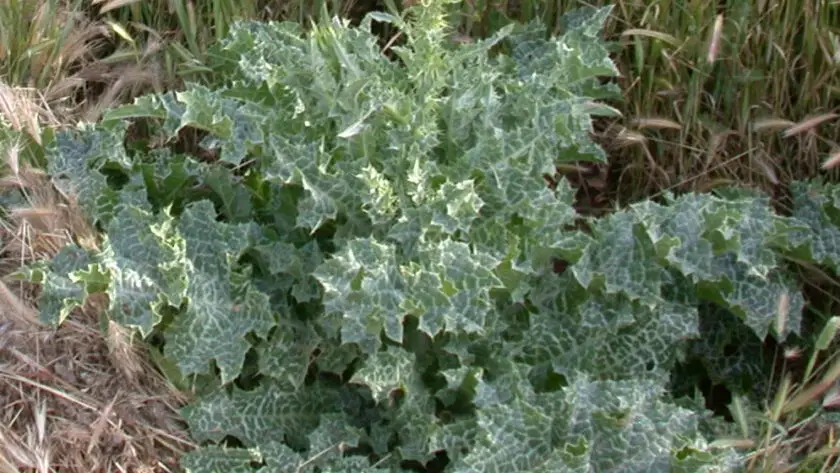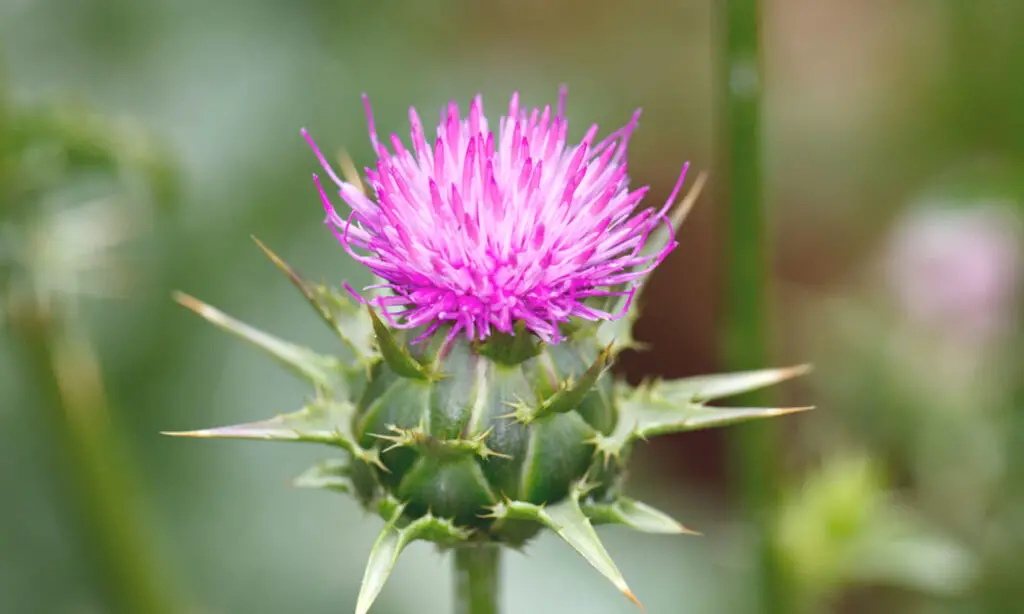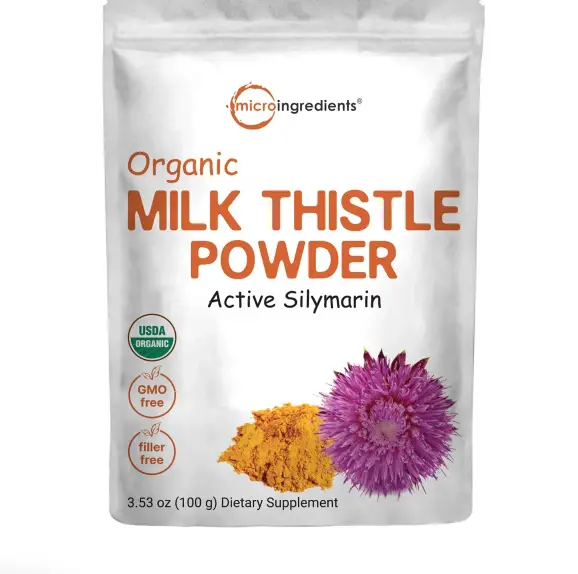In today’s era, it is increasingly common for plants (like Milk Thistle and the Dandelion) that were once valued for their abundant nutrients and medicinal properties to be relegated to the status of weeds.
One such plant is milk thistle (Silybum marianum), a robust herbaceous plant with spiky leaves and vibrant purple flowers. While it may be classified as a weed by many, milk thistle possesses healing powers that have somehow been hidden away to the common person.
Behind its unassuming appearance lies a potent medicinal herb with a rich history of therapeutic use. Prepare to discover the untapped potential of this extraordinary plant that has been hiding in plain sight.
What Is Milk Thistle
Milk thistle (Silybum marianum), a flowering plant native to the Mediterranean region. With its remarkable ability to combat inflammation, support liver health, alleviate symptoms of diabetes and OCD, and even show promise in cancer treatment, milk thistle has become a popular herbal remedy.
- Milk thistle grows up to six feet tall and can form dense stands. The rosette leaves are large, up to 20 inches long. Rosettes can reach 3 feet in diameter.
- The leaves are dark green with distinctive white marbling. The leaf edges have spines up to 1⁄2 inch long. The purple flowers are solitary and spiny.
- Milk Thistle is a part of the Sunflower family!
Isn’t Milk Thistle A Weed?
Milk thistle (Silybum marianum) is often considered a weed due to its resilient nature and ability to thrive in various environments. It has a prolific reproductive capacity, producing numerous seeds that can quickly populate an area and compete with other plants for resources.
According to KingCountry.Gov, Milk thistle is toxic to livestock when consumed in large quantities, and it forms dense stands in pastures and rangeland. Ingestion can also cause nitrate poisoning in cattle and sheep.
Additionally, milk thistle has spiky leaves and can grow quite tall, which can make it visually undesirable in certain landscapes. Its propensity to spread and dominate areas where it is not intentionally cultivated has led to its classification as a weed in agricultural and gardening contexts.
While milk thistle may be regarded as a weed in certain settings, it is important to recognize its valuable medicinal properties and the potential health benefits it offers. Its status as a weed should not overshadow its impressive medicinal value, which has been acknowledged for centuries.
Understanding the Active Compound: Silymarin
The key component responsible for milk thistle’s health benefits is a group of flavonoids known as silymarin. Silymarin is a potent antioxidant that helps protect the liver from damage caused by toxins, free radicals, and inflammation.
It promotes liver cell regeneration, enhances detoxification processes, and inhibits the growth of certain cancer cells. Moreover, silymarin exhibits anti-inflammatory properties, making it a valuable natural remedy for various health conditions.
Fighting Inflammation and Promoting Liver Health
Inflammation is a common underlying factor in numerous chronic diseases, including liver disorders. Milk thistle’s anti-inflammatory properties make it an effective ally in the fight against inflammation-related conditions.
Studies have shown that silymarin reduces liver inflammation, protects against liver damage caused by alcohol and toxins, and improves liver function in individuals with liver diseases such as cirrhosis and hepatitis.
Supporting Diabetes Management
The antioxidant and anti-inflammatory effects of milk thistle extend their benefits to individuals with diabetes. Silymarin has been found to improve insulin resistance, enhance glucose control, and reduce oxidative stress in diabetic patients.
It also aids in lowering blood sugar levels, making it a potential complementary treatment for managing diabetes. However, it is important to consult with a healthcare professional before incorporating milk thistle into your diabetes management plan.
Alleviating Symptoms of OCD
Obsessive-Compulsive Disorder (OCD) is a mental health condition characterized by intrusive thoughts and repetitive behaviors. Recent research suggests that milk thistle may provide relief for individuals suffering from OCD.
Silymarin’s antioxidant properties may help regulate neurotransmitters in the brain, such as serotonin, which plays a crucial role in mood regulation. While further studies are needed to establish a definitive link, milk thistle shows promise as a potential natural supplement for OCD management.
Exploring its Potential in Cancer Treatment
The potential of milk thistle in cancer treatment has attracted significant scientific interest. Silymarin has shown promising anticancer effects in various types of cancer, including breast, colon, lung, and prostate cancer.
It helps inhibit cancer cell growth, induces cell death (apoptosis), and may even enhance the effectiveness of certain chemotherapy drugs while reducing their toxic side effects. However, more extensive clinical trials are necessary to fully comprehend milk thistle’s role in cancer treatment.
Click here to get organic milk thistle for just 23 bucks from Microingredients!
Incorporating Milk Thistle into Your Routine
When selecting a milk thistle supplement, ensure it contains a standardized amount of silymarin to guarantee potency. Micro Ingredients Organic Milk Thistle can be mixed into your favorite beverage and drinken with ease.
Buy Micro Ingredients Organic Milk Thistle Powder with Active Silymarin Here
Additionally, milk thistle can be prepared as a tea by steeping crushed or powdered seeds in hot water. However, it is worth noting that the concentration of silymarin in tea may be lower compared to standardized supplements.
As with any herbal supplement, it is essential to be aware of potential side effects and interactions. Milk thistle is generally considered safe for most individuals when used as directed.
However, some people may experience mild gastrointestinal symptoms or allergic reactions. If you have existing medical conditions or are taking medications, consult your healthcare provider before incorporating milk thistle into your routine.
Conclusion
Milk thistle, with its active compound silymarin, offers a range of potential health benefits, including fighting inflammation, supporting liver health, aiding in diabetes management, and showing promise in cancer treatment.
Check Out Micro Ingredients Organic Milk Thistle Powder With Active Silymarin Here
While further research is needed to fully understand its mechanisms and effectiveness, milk thistle can be a valuable addition to a holistic approach to health and well-being.







